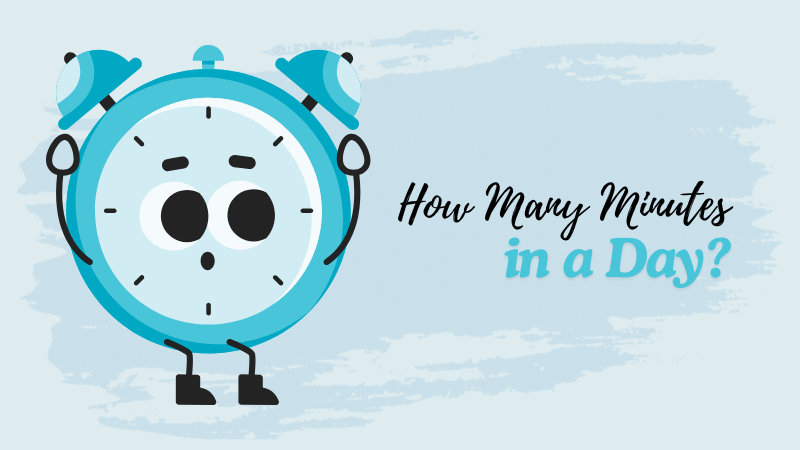How Many Minutes in a Day? A Quick and Easy Guide to Time Conversion

How Many Minutes in a Day? The Simple Way to Convert Time
What is the number of minutes in a day? It is a straightforward question, but the answer becomes more complicated upon closer examination, especially when you consider time in terms of hours and seconds and how we ration out our days.
As a practice, we typically define time in terms of hours and minutes, but if you were to calculate taking the entire 24-hour day into consideration, what does that break down to? Today, we’re getting into the numbers, confronting time, and showing how this conversion could affect us on a day-to-day level.
So, let’s cut to the chase: How many minutes in a day? It’s simple: 1,440 minutes. That’s because there are 24 hours in a day, and each hour has 60 minutes.
Let’s explore this a little more and see why grasping time, particularly minutes in a day, can make a difference in the way we live.
Some Time Basics: Hours, Minutes, and Seconds
Time basics Before we delve into the details of minutes, we should first consider the basics of time. Time as we know it: the hours, minutes, and seconds.
What is an hour?
An hour is a duration used in the 24-hour time system we all know. That is 1/24th of one day. An hour minutes; this, this byway, is usually further subdivided into 60 seconds.
What is a minute?
A minute is the lesser unit of time, and it is 1/60th of an hour. Sixty of these make one minute, which is, of course, the most commonly used base unit of time.
Our Measure of Time: The 24-Hour Day
The average day consists of 24 hours, which begins at 12:00 am and ends at 11:59 pm. To figure out how many minutes are in a full day, let’s do the math:
24 hours × 60 minutes per hour = 1440 minutes in a day.
Simple, right?
Why is it Important to Learn the Number of Minutes in a Day?
So you may ask, “What’s the importance of how many minutes in a day?” Yes, knowing the minutes might be handy in a few real-life situations, including
Time Management
We all know the saying time is money, and it is. Once you are aware that there are 1,440 minutes in a day, then you can start to make conscious decisions about what you are doing with those minutes. Are you spending them wisely? You are deliberately prioritizing the tasks that are most important to you. Dividing your day into more manageable parts (like 15 minutes) can help you work more efficiently.
Scheduling & Planning
Rounding out your day in minutes helps with time mapping, whether for meetings, personal projects, or workouts. Many people use time management methods like the Pomodoro Technique, where you break work into 25-minute periods. Knowing how many minutes in a day you have can assist you in how to have a more organized life and how to manage long-term goals better.
Health and Fitness
If you’re interested in health and fitness, the ability to count the number of minutes that you spend exercising and resting can allow you to stay on top of your performance. And if you have a specific fitness goal in mind, tracking the number of minutes you spend working out can also help you motivate yourself to stick with your exercise routine and make progress.
Mental Clarity
Did you ever have one of those days when you thought that there was not enough time to finish everything? Having the day broken into minutes can make time seem more concrete and diminish stress. It’s a psychological trick that prevents you from feeling overwhelmed over tasks instead of the daunting “big picture.”
Determining Minutes in Greater Units of Time
So now we know that there are 1,440 minutes in a day, but let’s use this concept and convert other measurements of time.
Minutes in a Week
A week is made up of 7 days. If you are trying to find the number of minutes there are in a week, you can do so by multiplying the number of minutes there are in a day (60 x 24) by 7.
10,080 minutes in a week: 1,440 minutes × 7 days = 10,080 minutes.
Minutes in a Month
Let’s say you have a month-long project and you need to figure out how many minutes you have in 30 days. Here’s how to calculate it:
1,440 minutes * 30 days = 43,200 minutes per 30-day month.
Minutes in a Year
A year has 365 days (unless it's a leap year). To add up the total number of minutes in a year, just multiply:
1,440 minutes × 365 days = 525,600 minutes per year.
Time Management Tips: How You Can Make Each Minute Count
Now that we understand the number of minutes in a day, we can discuss how to make the most of them. Time, after all, waits for no one, and we all want to maximize our day.
Prioritize Your Tasks
And look at your “I need to do a” list. What needs to be done today? What can wait? Your tasks are broken down by how much time you’ll need to spend on them, and you prioritize the most important. That will ensure that your day is productive and that your minutes are well spent.”
Chunk big tasks up into smaller ones.
Large projects are intimidating, but breaking them down into 20- to 30-minute chunks of time makes it easier to stay focused on and accomplish tasks. For example, you’re working on a report; time yourself working for 25 minutes and then take a 5-minute break.
Set Specific Time Blocks
Set aside specific time for certain activities. Instead of stating, “I will work on my project today,” say, “I will work on my project for 60 minutes from 2-3 PM. This provides for greater accountability.
Avoid Time Wasters
It can be really easy to look up, and 10 minutes have passed as you scrolled through social media or checked email. Try to schedule hours of the day for these activities and minimize the distractions so your productivity remains sacred.
Why Do We Continue to Follow the Time Units of an Hour and a Minute?
If it's so easy to figure out how many minutes are in a day, then why not just use minutes as our measurement and be done with it? Here’s why:
Historical Context
The segmentation of time into hours, minutes, and seconds has historical antecedents. The ancient Egyptians also divided the day into 24 hours, but the length of these hours varied, based on daytime and nighttime hours, with daytime hours being the longer of the two. From that point on, hours, minutes, and seconds became an established tradition for measuring time.
Human Nature
Humans think in chunks. In most cases, hours are what feels like a reasonable measure of time. But 60 minutes does give us nice, neat little parcels of time in which to break up tasks. You can’t gdoeverything in minutes, which might make it seem like you never have time to breathe.
And 4: Accept The Power Of Time
So, now that you know how many minutes are in a day, what are you doing with them? Learning how to segment time will help you own your day and get more done! Whether you are juggling work, personal projects, or simply the pursuit of fun, getting the most out of every minute sets you on a path to success.
So what are you going to do with your 1,440 minutes today?
Frequently Asked Questions
How many minutes are 2 days?
There are 2 days x 24 hours/day x 60 minutes/hour = 2,880 minutes.
How many minutes are in a year?
There are 525,600 minutes in a non-leap year (1,440 minutes × 365 days).
What is the number of minutes in a leap year?
A leap year consists of 527040 minutes (1440 minutes × 366 days).
Why don’t we count by seconds?
Minutes are a utilitarian measure for everyday purposes; it is about 1% of a day. Seconds are available for finer measurements.
How can I better utilize my 1,440 minutes per day?
Begin by organizing tasks, avoiding interruptions, and breaking complex projects into manageable portions. Time blocking and planning ahead will also ensure you get the most out of your day.
Call to Action:
Time’s ticking! Ready to make your day your own? Now maximize these 1,440 minutes and get involved in your free time online at Almeet and in our community by byhelpings others with time management.







